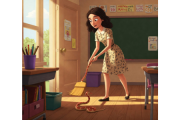3. Breath
The bishop and our parish priest offered communion, blessed and dismissed us. We exited the church quickly. Mother acknowledged people with a quick hello or nod on the church steps, but we spoke to no one. We raced home. “Why didn’t Dad come?” someone asked. Was it me? I don’t recall. Something must have happened, Mother said. Perhaps a bunch of cows got through the fence. Maybe he hurt himself, twisted an ankle in a badger hole. We don’t know.
Mother drove faster than usual, and she usually drove too fast. As we rounded the correction line corners near the Hammond farm the car skidded on the gravel such that we were slightly sideways as we exited each turn, but she did not lose control. Dust hung in the air within the car and stuck to the anointment oil the bishop had used to mark the sign of the cross on my forehead. It was itchy and I did not know if I should leave it on, or if I could rub it off. I asked Betty “do I have to leave it on or can I wipe it off?” “I don’t know. I don’t think it matters. Do what you want,” she said. I let it alone, let it itch, thinking it might be wrong in some way to rub it off.
As we came down our driveway, we could see that the half-ton was still there. Mother brought the car to a stop by the back door and as we jumped out, we were enveloped in the cloud of dust that had trailed our car. Mother dashed into the house and called for Dad. She went in and was out again in few seconds. She told us he wasn’t there and told Mary Ellen to go in and to call Vince, Dad’s cousin who lived a mile and a half from us. Mother said to tell him that we can’t find Joe. To come quickly. She told Betty to get the truck and me to get the gate. “We are going to look for him in the east pasture along the Bartusak fence. Tell Vince.”
As I closed the gate and Betty drove with Mother into the pasture, I saw that the barn door was open and it shouldn’t have been. I raced over to the barn, climbed the rail fence, carefully. I was still in my blazer, dress pants and shoes. I would be in trouble if I snagged or soiled them. I navigated around manure and wet areas, stepped on the threshold of the barn doorway, leaned in to grab the door handle, and saw Dad. He was laying on his back in the straw bedding and manure. His legs were folded back at the knees. His cap had fallen back off his head. The milk cow, still in the stall, let out a bellow when I came in.
I rushed in and knelt beside him. I straightened each leg and then took his hand and felt for a pulse on his wrist. I said “Dad don’t die”. My hands were shaking and cold and wet because I had plunged them into the straw bedding which was wet with icy spring runoff water and manure when I straightened his legs. I did not find a pulse, but thought it was because of my cold, shaking hands. Mother and I had done a St. John’s first aid course that winter and I knew what to do – check for a pulse, then move on to artificial respiration. I abandoned looking for a pulse, tilted dad’s head back, took a deep breath, and put my mouth over his. I remember feeling the whiskered skin of his face against mine. I remember becoming aware for the first time, in that instant, that Dad did not shave until after morning chores. I blew the air from my lungs into his mouth and felt my own warm breath return through his nose onto my cheek. I took another breath, tilted his head back further, and this time pinched his nose closed. I blew my breath into my Father. I took my mouth from his and turned my head to look at his chest which had received my breath and had risen. As his chest fell, I felt this breath returned to me. I felt it upon my cheek. It was cold.





Peter Scotchmer4 years ago
This is a moving and heartfelt evocation of a time of sorrow and dislocation, but with the compensation, however small at the time, of the discovery that life can and must go on despite bereavement, and that the natural world can still surprise us all when we re-establish connection with it, as happens in the final paragraph. What is especially powerful is the vivid use of descriptive detail– the piety of the family’s faith, the devotion of son for his father, the workaday world on a prairie farm, all as seen through a boy’s eyes– to make the story especially memorable. Great stuff!